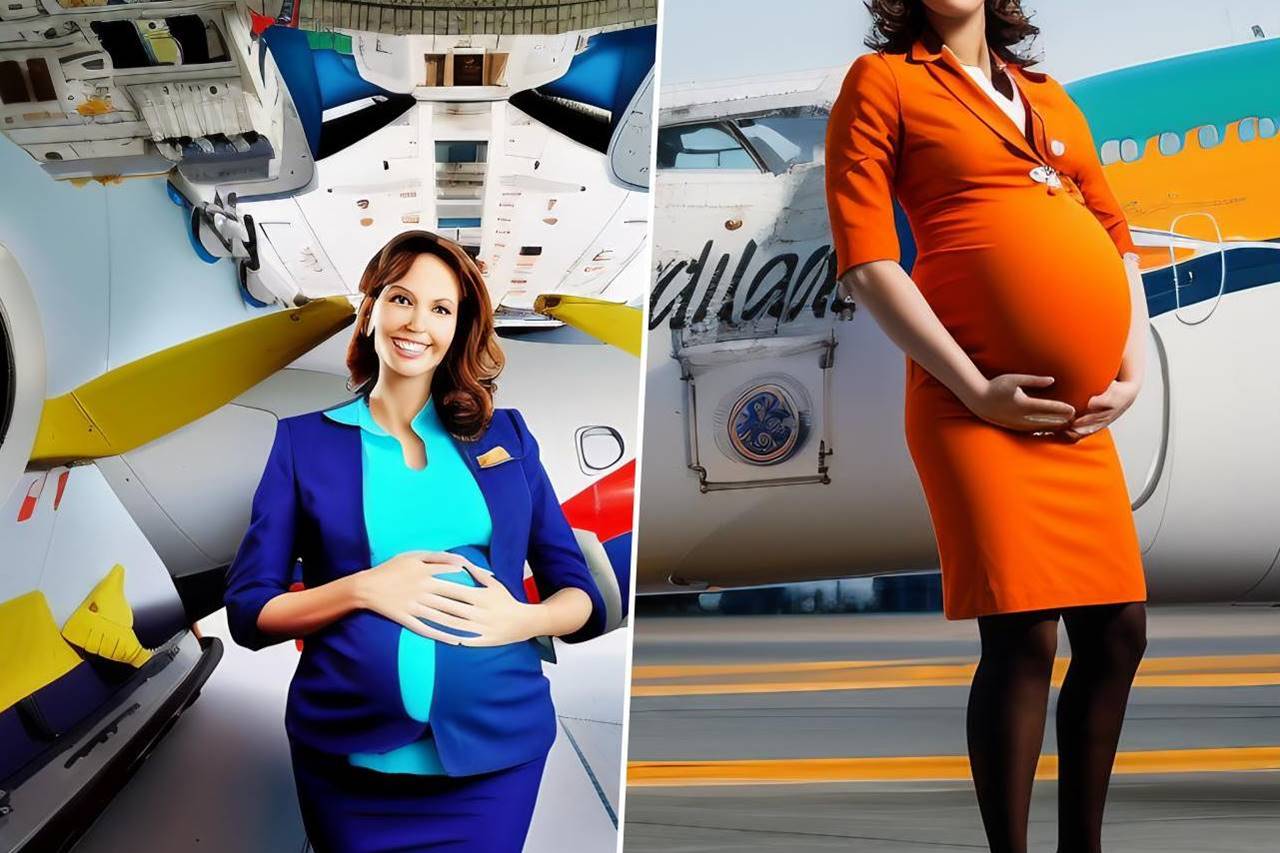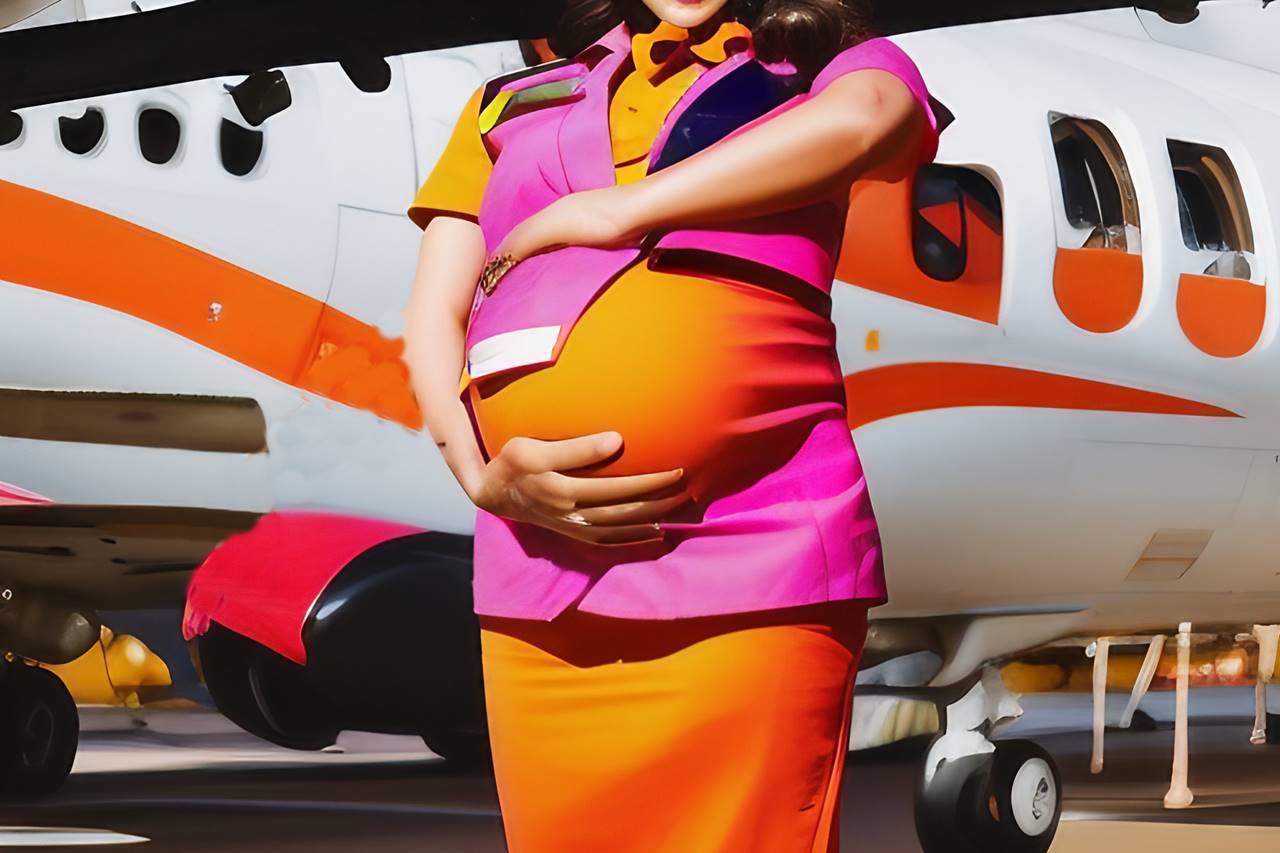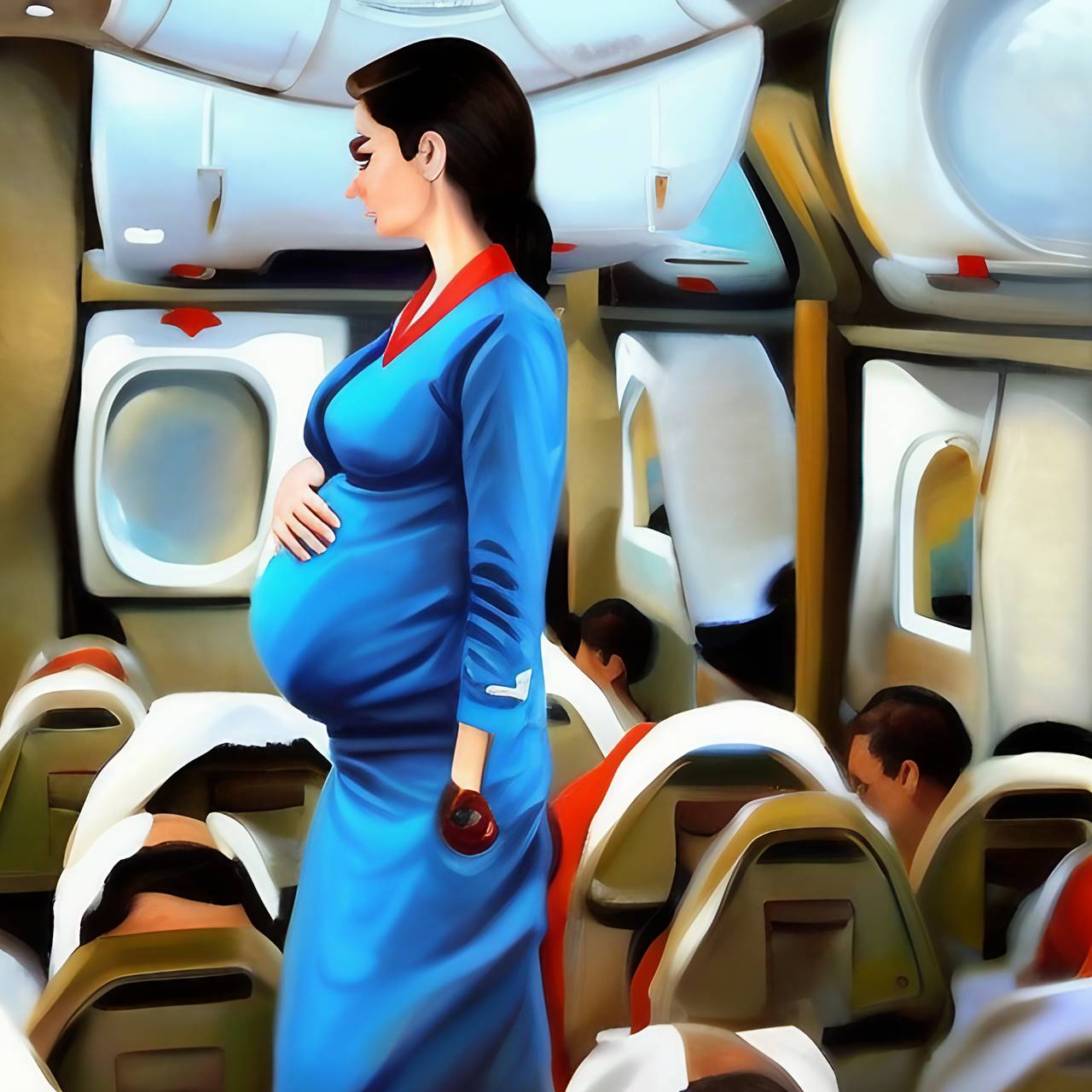No, pregnant flight attendants are not usually allowed to work on the plane. Most airlines have policies that prohibit female flight attendants from operating a plane during their pregnancy due to safety reasons. Additionally, it is important that they consult their physicians prior to beginning any new job duties as flying while pregnant can be physically demanding and potentially dangerous.
Expectant flight attendants should explore with their employers any special protocols regarding flying while pregnant before commencing in the role. Plus, they ought to be acquainted with all restrictions related to maneuvers that may be carried out during pregnancy.
Disclaimer: Some airlines have different regulations, so it is important for prospective flight attendants to consult their airlines before making any decisions. Female crew, please be aware of the risks associated with flying during pregnancy and make sure to take all necessary precautions!
Contents
- Safety Concerns over Flight Attendants Still Working on the Plane while Pregnant
- Flying While Pregnant as a Passenger vs Flying as a Flight Attendant While Pregnant
- What happens to flight attendants if found to be pregnant?
- Common Flight Attendant Pregnancy Rules and Policies
- Reasons Why Flight Attendants Still Attempt to Fly While Pregnant
- List of Maternity Benefits for Flight Attendants
- Do Flight Attendants Lose Their Job if Found to Be Pregnant?
- Work Options for Pregnant Flight Attendants
- What Happens to a Flight Attendant after Giving Birth?
- Reasons Why Flight Attendants Do Not Declare that they are Pregnant (Right Away)
- Video: Pregnant Cabin Crew Life
- Frequently Asked Questions
- 1. What can pregnant flight attendants do to ensure the safety of themselves and their unborn babies?
- 2. Are there any special considerations for pregnant Flight Attendants?
- 3. Is there a risk of discrimination against pregnant Flight Attendants?
- 4. How does an airline decide if a flight attendant needs refresher training after giving birth?
- 5. What kind of support can employers provide for pregnant Flight Attendants?
- 6. Are there any additional benefits Flight Attendants receive when pregnant?
- 7. How long can you work as a flight attendant pregnant?
- 8. Do male flight attendants also get parental leave?
- Summary

Safety Concerns over Flight Attendants Still Working on the Plane while Pregnant
Why are flight attendants prohibited from working when pregnant? The main factor is the safety of the baby. Safety concerns for pregnant flight attendants on planes include:
- Dangers posed by exposure to radiation during air travel can be harmful to a developing fetus.
- Physically demanding work that can be difficult for a pregnant woman to perform.
- Increased risk of dehydration due to cabin pressurization.
- Risk of injury from turbulence and/or turbulence-related accidents/incidents.
- The potential of being exposed to engine exhaust fumes, or other airborne chemicals while working up close in the cabin.

Flying While Pregnant as a Passenger vs Flying as a Flight Attendant While Pregnant
If it’s okay to fly while you are pregnant, then why can’t a flight attendant work while pregnant?
Take note that flying while pregnant is relatively safe and is only intended for passenger travel where they fly once or twice in a month. But if you are a flight attendant expecting a baby, then you will be flying multiple times, which can subject you and your baby to many risks.
When you fly as a passenger, you just sit and sleep. When you fly as a crew, you will lift containers, push heavy carts, assist with luggage, stand and walk for hours.
It’s just more physically exhausting on a pregnant person. You also don’t fly as much when you fly as a passenger compared to flying as a flight attendant. Flight attendants have an average of 75 flying hours per month.
Consider just the physical aspects of the job and you will understand that it won’t be wise to let a pregnant flight attendant work. Pregnancy affects a woman’s physical and mental energy, labor intensive duties like pushing carts and serving meals can become dangerous if not done with utmost care.
When biological rhythms are disrupted, the hormones in our body become unbalanced and can lead to heightened levels of stress and anxiety, with many flight attendants experiencing irregular or missed periods soon after they take up flying. Extensive research has demonstrated that airline stewards are more prone to menstrual cycle disruptions. Furthermore, traveling while expecting can be an intimidating endeavor, and is usually prohibited past 36 weeks of gestation.
Although it’s possible to fly safely while pregnant, the environment on an airplane can be very difficult for expecting mothers. High altitudes and low oxygen levels may cause dizziness or nausea, while turbulence can increase the risk of falling.
What happens to flight attendants if found to be pregnant?
If a flight attendant is found to be pregnant, they will stop flying. They will be placed on medical maternity leave until the pregnancy ends. During this time, she may receive some form of compensation (allowance) and health benefits from her employer, but will not be able to work or fly during her pregnancy.
Upon returning to work post-pregnancy, flight attendants must again consult their physician and airline policies before resuming any job duties.
When flight attendant discovers they are pregnant, their service and flying license will be suspended until after the birth of their child. This is due to concerns about the environment that they would be exposed to while flying. Flying in an aircraft can often involve pressurization of the cabin up to 30,000 feet above sea level, which is considered not suitable for pregnant women.
There is also some evidence suggesting that expectant mothers may be more prone to birthing deformed babies if frequently exposed to this type of environment.
From a practical perspective, the demands of being a Flight Attendant can put significant strain on an expecting mother both physically and mentally. Serving over 200 passengers (in major airlines) at any given time requires high levels of alertness and physical ability; something which may become difficult to overcome.
For these reasons, it is important for expecting mothers within this role to take extra care and rest during their pregnancy so as to ensure they remain healthy throughout their term.

Common Flight Attendant Pregnancy Rules and Policies
- Informing the airline of the pregnancy and providing documentation: Flight attendants are required to inform their airline in advance of their pregnancy, and supply medical documentation verifying the pregnancy. This ensures that the airline is aware of any restrictions or modifications that may be necessary for pregnant flight attendants.
- Restricting certain duties: Flight attendants who are pregnant may be restricted from certain duties that could pose a risk to their health or the health of their unborn child. These duties could include serving alcohol, lifting heavy items, or flying in adverse weather conditions.
- Restricting activity and taking time off: During certain stages of their pregnancies, flight attendants may have to take time off to rest or avoid strenuous activity such as long flights or flying in turbulent conditions. They may also have to restrict activity by taking frequent breaks throughout the day or avoiding tasks involving prolonged standing or sitting.
- Taking a mandatory leave of absence before maternity leave begins: Many airlines require flight attendants to take a mandatory leave of absence before they begin their maternity leave. This helps ensure that they are able to transition into motherhood while still fulfilling their role as an employee with the airline.
Reasons Why Flight Attendants Still Attempt to Fly While Pregnant
Despite the reservations of many airlines, some Flight Attendants still choose to continue flying during pregnancy. This may be due to a number of reasons.
- Financial Security and Obligations – Usually, if you don’t fly, you don’t get paid for flying hours. Some may feel that they need to remain at work and ensure their financial security by continuing with their duties.
- Career Progression – Some may feel that being pregnant might hinder their chances of career progression and hence choose to continue working. Also, some may be in the middle of a promotion or a new venture and feel that they cannot abandon their projects.
- Mental Well-Being – Some may believe it is better for them to remain in an environment they are comfortable with, rather than having to take on a completely new role while pregnant. After all, getting pregnant will require you to take on a whole new set of responsibilities, such as taking care of yourself and the baby.
In any case, it is always important to listen to advice from your doctor and ensure that you do not overwork yourself during this period. Ultimately, the safety of both mother and child should be paramount when making decisions about whether or not to fly while pregnant.

List of Maternity Benefits for Flight Attendants
Every airline is different, but just to give a reference based on my experience working for an international airline, here is a list of potential maternity benefits that may be available:
- Paid Maternity Leave – While there may be no flying pay, some airline companies provide a paid allowance for the whole 9-10 months while you are pregnant (and 45 days after giving birth).
- Unpaid Maternity Leave – After giving birth, some flight attendants still wish to stay at home. Some airline companies provide you with an option for special leave for up to 3 months. Even if you are not paid a salary, you will still retain your benefits such as insurance and vacation time.
- Flexible Working Hours – After giving birth, some airlines may allow Flight Attendants to work flexible hours. This can include reduced or changed schedules, allowing for more time spent at home with your new baby.
- Medical Benefits (Pre-Natal Checkups until Baby Delivery): I’m very lucky to have this one as the airline has shouldered all maternity benefits including doctor’s appointments, prenatal checkups, and child labor delivery fees (Normal Deliveries or Caesarian Section).
- Ground Job Opportunities – Some airlines allow pregnant flight attendants to switch to a ground job. This could include customer service, check-in counter staff, or baggage handler jobs. This allows the air hostesses to still earn a salary income every month.
The benefits depend on how long you have been working for an airline. So please check with your airline to find out what your benefits are. It’s always important to research and understand what is on offer before making any long-term decision for yourself or your baby.
Do Flight Attendants Lose Their Job if Found to Be Pregnant?
No, flight attendants do not lose their job when they are found to be pregnant. In fact, some airlines have policies where Flight Attendants who become pregnant are placed on medical maternity leave and receive compensation from the airline.
Some airline companies require you to serve a minimum of 3 years so that you can keep your job. These policies can differ from airline to airline so it is important to familiarize yourself with your own airline’s policy in this regard.
In most cases, after the birth of a child, the Flight Attendant will need to consult with their physician and re-assess their ability before returning to work. During this time, she may also need to undergo a physical examination or may need additional training before being allowed back into the cabin.

Work Options for Pregnant Flight Attendants
Please check with your airline for detailed policies and procedures on what to do if you discover that you are pregnant. In the meantime, there are many work options available to pregnant Flight Attendants who choose not to fly or can no longer fly due to health reasons. These include:
1. Ground staff Job – Taking a position as ground staff at the airport allows for interaction with people and some variety in your day-to-day duties. Job roles such as customer service agent, baggage handler, or check-in counter worker may be available.
2. Training and Assessment Job– Becoming a training and assessment officer would allow you to use your experience to help others in their roles. This can include writing documents, policies and safety procedures as well as helping new recruits with onboarding.
3. Office work – Airline offices often have opportunities for administrative work such as customer service, accounting, or social media roles which may be suitable for Flight Attendants during pregnancy.
4. Working from home – Many airlines offer the opportunity to work remotely while pregnant allowing you to stay connected with the organization while taking care of yourself and your baby. For example, some airlines may provide call center roles where you can respond to customer queries over the phone or even do online work such as web design and online marketing.
Ultimately, it is important for expecting Flight Attendants to have an open conversation with their employer about the best way to manage their pregnancy and ensure their safety while continuing work. With the right support and understanding from your employer, you can make sure that you look after both your well-being and that of your baby.
What Happens to a Flight Attendant after Giving Birth?
Once flight attendant returns after giving birth, they will need to attend refresher courses or initial training depending on how long they have been out of practice.
Depending on the airline, some may require refresher courses for any absences of six months or less, while others may require full initial training if the absence is longer than 6 months.
This ensures that all safety protocols and regulations are adhered to and that the flight attendant remains up to date on their skillset.
Flight attendants are also required to get a medical fitness certificate allowing them by their doctors as safe to fly (fit-to-fly certificate).

Reasons Why Flight Attendants Do Not Declare that they are Pregnant (Right Away)
Some cabin crew do not declare their pregnancy right away due to some of the following reasons:
- Concerns that their employer may find out and terminate their employment: Pregnant flight attendants often fear telling employers about their pregnancy for fear of losing their job or facing other forms of discrimination.
- Worries about discrimination based on pregnancy or motherhood: Women often worry that they may face discrimination from crew members, supervisors, or the airline itself if they declare their pregnancy.
- Fear of being seen as less competitive within the profession: Flight attendants who are pregnant can also feel intimidated by the thought of competing against non-pregnant individuals in a very competitive industry.
- Believing that there is no need to declare until it is further along in the pregnancy: Some flight attendants believe that they do not have to declare their pregnancies until it reaches a certain point so as to alleviate any possible fear of repercussions.
- Opportunity to earn more income: Some flight attendants may also choose to remain silent about their pregnancy so that they can continue working as long as possible in order to earn more income.
- Some have flying obligations that they might need to attend to: Some flight attendants may want to travel to a specific destination in their rostered flight before they reveal their pregnancy as they may not be able to fulfill the obligation afterward.
- Rules on pregnancy out of wedlock: In certain countries in the Middle East, it is against the law to be pregnant out of wedlock, so some flight attendants may want to keep their pregnancies a secret until they are married.
Overall, being a Flight Attendant during pregnancy can be an intimidating and daunting experience. It is important for expecting Flight Attendants to discuss the best way forward with their employer in order to ensure that both the employee’s safety and well-being as well as that of the baby is taken into consideration. With proper guidance, support, and understanding from your airline, you can continue working while looking after yourself and your growing family.
Video: Pregnant Cabin Crew Life
Check out this important video featuring this hot topic on pregnancy and being a cabin crew. What are the expectations and effects? Please watch the clip below:
Frequently Asked Questions
1. What can pregnant flight attendants do to ensure the safety of themselves and their unborn babies?
Pregnant Flight Attendants should consult with their employers to understand any policies that they may need to follow while flying, such as avoiding any lengthy flights, getting adequate rest before and after flights, and having access to necessary medical attention if needed. Additionally, it is important for pregnant Flight Attendants to be aware of any safety protocols that the airline has in place and make sure that they are following them.
2. Are there any special considerations for pregnant Flight Attendants?
Yes, many airlines provide special allowances for pregnant Flight Attendants such as maternity leave or reduced hours during certain stages of pregnancy. Additionally, some airlines may offer additional support such as providing access to extra rest periods or more breaks during a flight.
3. Is there a risk of discrimination against pregnant Flight Attendants?
Unfortunately, in some cases, discrimination based on pregnancy or motherhood can occur during the hiring process or while onboarding an aircraft. It is important to note however that most airlines have policies in place that protect pregnant employees from discrimination and provide equal opportunities for advancement within the profession.
4. How does an airline decide if a flight attendant needs refresher training after giving birth?
Answer: Many airlines require Flight Attendants returning from maternity leave to attend either refresher courses or initial training depending on how long they have been out of practice. Generally speaking, if the absence is greater than six months then refresher courses will be required while absences of 12 months or longer will require full initial training in order to ensure that all safety protocols are up-to-date and being followed correctly.
5. What kind of support can employers provide for pregnant Flight Attendants?
Answer: Employers can offer expecting mothers flexible working arrangements so that they can still fulfill their duties while taking into account their own needs at this time such as additional rest periods or lighter workloads depending on the stage of pregnancy they are at. Additionally, employers should ensure that their staff are educated on relevant policies so that they feel supported and know what resources are available throughout their maternity journey.
6. Are there any additional benefits Flight Attendants receive when pregnant?
Many airlines provide additional support to expecting mothers by offering them access to special allowances such as discounted or free health insurance, reduced hours for certain stages of pregnancy, and maternity leave. Additionally, some airlines may even provide financial assistance for childcare or other related expenses during the employee’s maternity leave. The specifics of these benefits typically vary from airline to airline so it is important for pregnant Flight Attendants to consult with their employer in order to understand what options are available to them.
7. How long can you work as a flight attendant pregnant?
Most airlines require air hostesses to stop flying immediately so they are not allowed to work on the plane if found pregnant. It is important to check with your employer in order to understand what policies they have in place regarding working while pregnant so that you can ensure you
8. Do male flight attendants also get parental leave?
Yes, most airlines provide male flight attendants with parental leave albeit usually much shorter than that provided to their female counterparts. However, this length of leave may vary from airline to airline so it is important to check with your employer in order to understand what specific benefits are available. Additionally, some airlines may provide additional support for male Flight Attendants such as reduced hours or access to extra rest periods during their paternity leave.

Summary
So can you officially work as a flight attendant while pregnant? The answer is no. And this is because of the safety precautions needed to keep the baby (and mother safe).
It is important for pregnant Flight Attendants to be aware of any rules that their airline has in place and make sure they are following them. They should also consult with their employers to understand the benefits available to them during this time such as maternity leave or reduced hours.
Additionally, airlines must ensure that all staff is educated on relevant policies so that expecting mothers feel supported throughout their journey. With these tips in mind, Flight Attendants can rest assured knowing that there is support out there for them when needed and enjoy a safe and successful pregnancy while continuing to do what they love – flying!